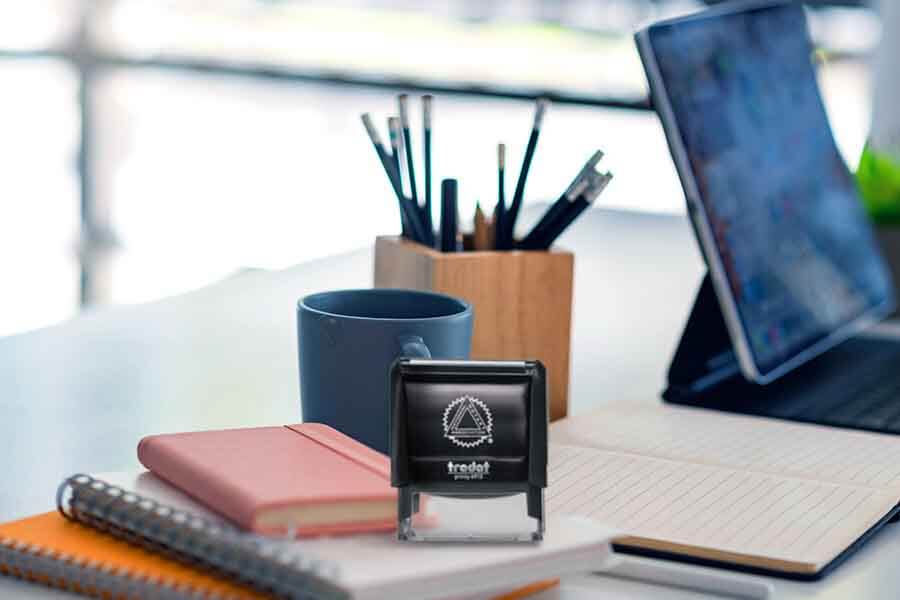
Updated 9-30-24. Protecting your seal and journal from potential misuse at work is an important part of your Notary duties.
Here are four important points Notaries and their employers should know about using Notary seals and journals in the workplace:
- The seal and journal belong to the Notary (Usually).
- The seal and journal should always be kept secured.
- Only the Notary may use the seal and journal.
- Notaries must refuse improper seal and journal requests.
1. The seal and journal belong to the Notary (Usually).
Just because an employer paid for your Notary seal and journal doesn’t automatically entitle them to keep those tools if you leave the business. In most cases, you keep your Notary tools. For example, Florida law specifies that a Notary's seal must not be turned over to an employer upon termination of employment, regardless of who paid for the Notary's seal. While Texas law does not directly address possession of a Notary's tools, the state attorney general has issued an opinion that an employer does not own a Notary's seal or journal, and these tools should remain in the Notary's possession at all times (Texas Attorney General Opinion GA-0723).
However, a few states have exceptions regarding journals. In Arizona, some Notaries working in professions involving sensitive information are authorized to keep two journals: one for public records and one for nonpublic records protected by attorney-client privilege or state and federal confidentiality laws. A journal containing nonpublic records is the property of the employer, and if the Notary leaves the job, the employer may keep it. The Notary keeps the journal with public records.
Oregon gives Notaries the option of signing an agreement with an employer that allows the employer to keep the journal when the Notary stops working for the employer. An Oregon Notary must keep a copy of this agreement.
When a Colorado Notary's commission ends, Notaries have the option to leave their journal with their employer and provide the employer's contact information to the Secretary of State.
Employers and Notaries should familiarize themselves with their state laws regarding the ownership of a Notary’s tools and follow those rules.
2. The seal and journal should always be secured.
A stolen Notary seal can be used for fraud, and a journal contains sensitive private information about signers that, in the wrong hands, could be used for identity theft or other crimes. That’s why your seal and journal always must be stored in a secure location under your sole control when not in use.
Some states require this in their laws. For example, California specifically states that Notaries must always store their journals and seals in a locked, secure area under the Notary’s exclusive control when not in use.
But even in states that don’t specify how they must be stored, the NNA strongly recommends that Notaries store their tools in a secure location such as a safe or locked desk drawer. Leaving your tools in an unsecured area, such as on top of your desk, leaves you vulnerable to someone finding and taking them — which, in turn, opens you up to a world of legal trouble and potential lawsuits.
3. Only the Notary may use the seal and journal.
Remember that your tools aren’t ordinary office supplies like staplers or pencil sharpeners. Your seal and journal belong to you and may only be used by you; they cannot be borrowed or used by a boss or coworkers. If you’re out sick, for example, your boss cannot have another employee use your seal to start stamping documents. Nor can your boss require you to share your Notary tools with coworkers to speed up business operations.
It’s a serious violation of law for anyone other than you to use your tools — and could get you, your coworker and your boss in very serious legal trouble.
4. Notaries must refuse improper seal and journal requests.
Supervisors and colleagues often aren’t familiar with the strict rules Notaries are required to follow. If a boss or coworker wants to borrow your tools, asks you to let someone else use them or makes any other requests you know are illegal, you must refuse.
It’s helpful to keep your state Notary laws handy so you can show why you have to say no. Refusing illegal requests and following proper practices not only protects your commission, it protects both you and your workplace from potential lawsuits.
David Thun is the Assistant Managing Editor with the National Notary Association.
Related Articles:
Notarizing on the job: What you and your boss need to know
How to handle requests for your Notary journal entries
Additional Resources:
NNA Notary Hotline
Errors And Omissions Insurance Information